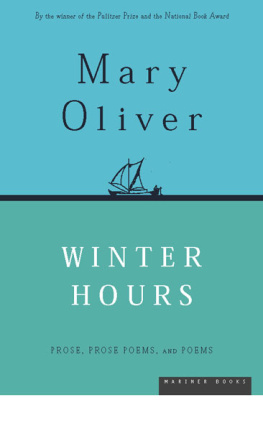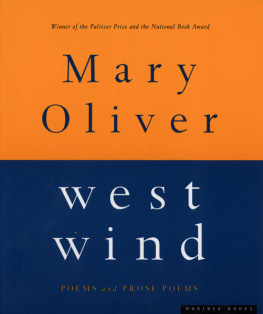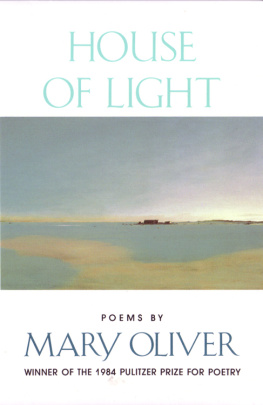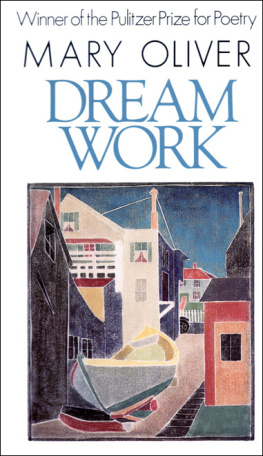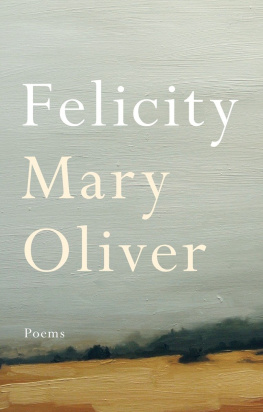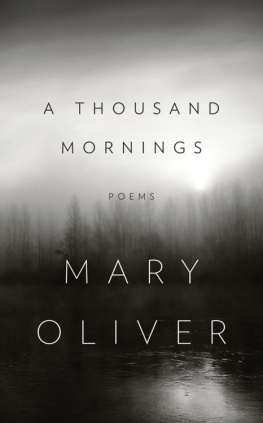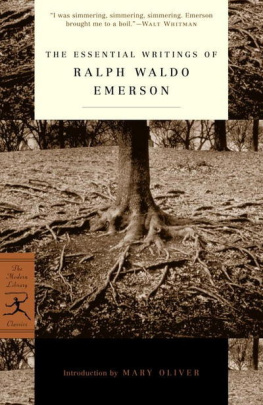Acknowledgments
I thank the editors of the following magazines and anthologies in which some of these poems and essays have been printed:
Appalachia, a section of Winter Hours
Green Mountains Review, Moss
Ohio Review, Sister Turtle, and The Bright Eyes of Eleonora: Poe's Dream of Recapturing the Impossible
Poetry, The Storm
Poetry East, The Swan (essay)
Shenandoah, Building the House
Virginia Quarterly Review, Three Prose Poems
Sister Turtle also appears in The Anchor Essay Annual: The Best of 1998, published by Anchor Books/Doubleday.
Building the House also appears in The Best American Essays 1998, published by Houghton Mifflin.
The Swan (poem) appears in my book House of Light. Copyright 1990 by Mary Oliver. Reprinted by permission of Beacon Press, Boston.
*A11 quotations are taken from The Collected Tales and Poems of Edgar Allan Poe (New York: Modern Library, 1992).
***
All italics in quotations are mine.
***
* Robert Frost: Collected Poems, Prose, & Plays (New York: Library of America, 1995), p. 742.
***
*One would like to say, Here, at least, he could relax. But "relax" is far too free and easy a word ever to use with Hopkins.
***
*From The Varieties of Religious Experience, in William James: Writings, 19021910 (New York: Library of America, 1987). The particular phrases quoted can be found on pp. 343-344.
***
Ibid., p. 357.
***
*The number of pages devoted to this poem in Walt Whitman: Complete Poetry and Collected Prose (New York: Library of America, 1982).
***
*Poem length is taken from the volume previously cited.
***
*The first three "Sand Dabs" are in two previous books, Blue Pastures and West Wind. The sand dab is a small, bony, not very significant but well-put-together fish.
***
*Probably Theridium tepidariorum.
PART ONE
Essays and Poems
PART TWO
Four Poets
PART THREE
Intermission
PART FOUR
Winter Hours
Building the House
1
I KNOW A YOUNG MAN who can build almost anythinga boat, a fence, kitchen cabinets, a table, a barn, a house. And so serenely, and in so assured and right a manner, that it is joy to watch him. All the same, what he seems to care for bestwhat he seems positively to desireis the hour of interruption, of hammerless quiet, in which he will sit and write down poems or stories that have come into his mind with clambering and colorful force. Truly he is not very good at the puzzle of wordsnot nearly as good as he is with the mallet and the measuring tapebut this in no way lessens his pleasure. Moreover, he is in no hurry. Everything he learned, he learned at a careful pacewill not the use of words come easier at last, though he begin at the slowest trot? Also, in these intervals, he is happy. In building things, he is his familiar self, which he does not overvalue. But in the act of writing he is a grander man, a surprise to us, and even more to himself. He is beyond what he believed himself to be.
I understand his pleasure. I also know the enclosure of my skills, and am no less pert than he when some flow takes me over the edge of it. Usually, as it happens, this is toward the work in which he is so capable. There appears in my mind a form; I imagine it from boards of a certain breadth and length, and nails, and all in cheerful response to some need I have or think I have, aligned with a space I see as opportunistic. I would not pry my own tooth, or cobble my own shoes, but I deliberate unfazed the niceties of woodworkingnothing, all my life, has checked me. At my side at this moment is a small table with one leg turned in slightly. For I have never at all built anything perfectly, or even very well, in spite of the pleasure such labor gives me. Nor am I done yet, though time has brought obstacles and spread them before mea stiffness of the fingers, a refusal of the eyes to switch easily from near to far, or rather from far to near, and thus to follow the aim of the hammer toward the nail head, which yearly grows smaller, and smaller.
Once, in fact, I built a house. It was a minuscule house, a one-room, one-floored affair set in the ivies and vincas of the backyard, and made almost entirely of salvaged materials. Still, it had a door. And four windows. And, miraculously, a peaked roof, so I could stand easily inside, and walk around. After it was done, and a door hung, I strung a line from the house so that I could set a lamp upon the built-in table, under one of the windows. Across the yard, in the evening with the lamplight shining outward, it looked very sweet, and it gave me much satisfaction. It seemed a thing of great accomplishment, as indeed, for me, it was. It was the house I had built. There would be no other.
The labor of writing poems, of working with thought and emotion in the encasement (or is it the wings?) of language, is strange to nature, for we are first of all creatures of motion. Only secondlyonly oddly, and not naturally, at moments of contemplation, joy, grief, prayer, or terrorare we found, while awake, in the posture of deliberate or hapless inaction. But such is the posture of the poet, poor laborer. The dancer dances, the painter dips and lifts and lays on the oils; the composer reaches at least across the octaves. The poet sits. The architect draws and measures, and travels to the quarry to tramp among the gleaming stones. The poet sits, or, if it is a fluid moment, he scribbles some words upon the page. The body, under this pressure of non-existing, begins to draw up like a muscle, and complain. An unsolvable disharmony of such workthe mind so hotly fired and the body so long quiescentwill come sooner or later to revolution, will demand action! For many years, in a place I called Blackwater "Woods, I wrote while I walked. That motion, hardly more than a dreamy sauntering, worked for me; it kept my body happy while I scribbled. But sometimes it wasn't at all enough. I wanted to build, in the other way, with the teeth of the saw, and the explosions of the hammer, and the little shrieks of the screws winding down into their perfect nests.
2
I began the house when I returned one spring after a year of teaching in a midwestern city. I had been, for months, responsible, sedate, thoughtful, and, for most of my daylight hours, indoors. I was sick for activity. And so, instead of lingering on the porch with my arrangement of tools, banging and punching together some simple and useful thinganother bookshelf, another tableI began the house.
When anything is built in our town, it is more importantly a foundation than a structure. Nothingbe it ugly, nonconforming, in violation of bylaws or neighbors' rightsnothing, once up, has ever been torn down. And almost nothing exists as it was originally constructed. On our narrow strip of land we are a build-up, add-on society. My house today, crooked as it is, stands. It has an undeniable value: it exists. It may therefore be enlarged eventually, even unto rentable proportions. The present owners of the property would not dream of discarding it. I can see from the road, they have given it a new roof and straightened out some doubtful portions of the peaked section. To one end of the peak, they have attached a metal rod that holds, in the air above the house, a statue of a heron, in the attitude of easy flight. My little house, looking upward, must be astonished.
The tools I used in my building of the house, and in all my labor of this sort, were a motley assortment of hand tools: hammer, tack hammer, drivers of screws, rasps, planes, saws small-toothed and rip, pliers, wrenches, awls. They had once belonged to my grandfather, and some of them to my great-grandfather, who was a carpenter of quality, and used the finer title cabinet-maker. This man I know only from photographs and an odd story or two: for example, he built his own coffin, of walnut, and left it, to be ready when needed, with the town mortician. Eventually, like the tiniest of houses, and with his body inside, it was consumed by flame.
Next page
